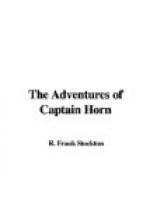The next day, when they had an opportunity for an African conversation, Inkspot assured his countryman that he had discovered the little locker by smelling the whiskey through the boards, and that, having no key, he had determined to force it open with a hatchet. Maka could not help thinking that Inkspot had a wonderful nose for an empty bottle, and could scarcely restrain from a shudder at the thought of what might have happened had the bottle been full. But he did not report the occurrence. Inkspot was a fellow-African, and he had barely escaped punishment for his former misdeed. It would be better to keep his mouth shut, and he did.
Against the north winds, before the south winds, and on the winds from the east and the west, through fair weather and through foul, the Arato sailed up the South Atlantic. It was a long, long voyage, but the schooner was skilfully navigated and sailed well. Sometimes she sighted great merchant-steamers plying between Europe and South America, freighted with rich cargoes, and proudly steaming away from the little schooner, whose dark-green hull could scarcely be distinguished from the color of the waves. And why should not the captain of this humble little vessel sometimes have said to himself, as he passed a big three-master or a steamer:
“What would they think if they knew that, if I chose to do it, I could buy every ship, and its cargo, that I shall meet between here and Gibraltar!”
“Captain,” said Shirley, one day, “what do you think about the right and wrong of this?”
“What do you mean?” asked Captain Horn.
“I mean,” replied Shirley, “taking away the gold we have on board. We’ve had pretty easy times lately, and I’ve been doing a good deal of thinking, and sometimes I have wondered where we got the right to clap all this treasure into bags and sail away with it.”
“So you have stopped thinking the bags are all filled with anthracite coal,” said the captain.
“Yes,” said the other. “We are getting on toward the end of this voyage, and it is about time to give up that fancy. I always imagine, when I am near the end of a voyage, what I am going to do when I go ashore, and if I have any real right to some of the gold down under our decks, I shall do something very different from anything I ever did before.”
“I hope you don’t mean going on a spree,” said Burke, who was standing near. “That would be something entirely different.”
“I thought,” said the captain, “that you both understood this business, but I don’t mind going over it again. There is no doubt in my mind that this gold originally belonged to the Incas, who then owned Peru, and they put it into that mound to keep it from the Spaniards, whose descendants now own Peru, and who rule it without much regard to the descendants of the ancient Peruvians. Now, when I discovered the gold, and began to have an idea of how valuable the find was, I knew that the first




